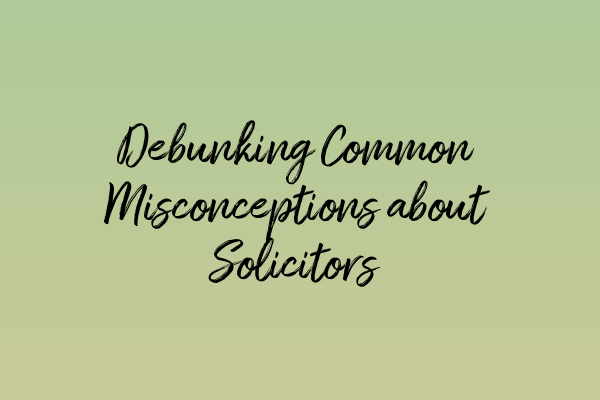Debunking Common Misconceptions about Solicitors
As a solicitor, I often come across many misconceptions and stereotypes about my profession. These misconceptions can be misleading and can prevent individuals from fully understanding the role and importance of a solicitor in legal matters. In this blog post, I aim to debunk some of these common misconceptions and shed light on the true nature of solicitors.
Misconception #1: Solicitors are only for criminal cases.
This is perhaps one of the most prevalent misconceptions about solicitors. While solicitors do play a crucial role in criminal cases, they are involved in various other areas of law as well. From family law and property law to corporate law and intellectual property law, solicitors provide legal advice and representation across a wide range of legal matters. It is essential to recognize that solicitors are knowledgeable and experienced professionals who can assist in many different legal scenarios.
Misconception #2: Solicitors are expensive and only for the wealthy.
Contrary to popular belief, solicitors are not only accessible to the wealthy. The legal profession has evolved over the years, and there are now various options available to ensure legal representation is affordable for all. Many solicitors offer free or low-cost initial consultations, and some operate on a no-win, no-fee basis, particularly for personal injury cases. Additionally, legal aid is available for individuals who meet certain criteria and cannot afford legal representation. The cost of hiring a solicitor should not deter anyone from seeking the legal assistance they need.
Misconception #3: Solicitors are out to deceive or manipulate their clients.
This misconception arises from a misunderstanding of the solicitor-client relationship. Solicitors have a professional duty to act in the best interests of their clients and uphold the highest ethical standards. They provide legal advice based on their expertise and knowledge of the law. Solicitors are bound by strict rules and regulations set by the Solicitors Regulation Authority (SRA) to ensure client protection and maintain professional integrity. It is important to trust in the professionalism and ethical conduct of solicitors.
Misconception #4: Solicitors only work in an office and have no courtroom experience.
While solicitors do spend a significant amount of time working in their offices, they also have courtroom experience. In fact, solicitors often represent clients in court, particularly in lower-level offences and civil cases. They are trained to present arguments, cross-examine witnesses, and advocate for their clients in a courtroom setting. It is important to recognize that solicitors are skilled negotiators and litigators who are well-prepared to present your case in court if necessary.
Misconception #5: Solicitors are interchangeable and offer the same level of expertise.
Every solicitor brings a unique set of skills, experiences, and expertise to their practice. It is crucial to choose a solicitor who specializes in the area of law relevant to your case. Specialization allows solicitors to develop in-depth knowledge and understanding of specific legal areas, enabling them to provide the best possible advice and representation. When selecting a solicitor, it is important to research their background, qualifications, and track record to ensure they are the right fit for your legal needs.
In conclusion, solicitors are highly skilled professionals who play a vital role in our legal system. They are not limited to criminal cases and are accessible to individuals from all walks of life. Solicitors are guided by professional ethics and act in the best interests of their clients. They have courtroom experience and offer specialized expertise in various areas of law. It is important to dispel these common misconceptions about solicitors to fully appreciate the valuable services they provide.
If you’re interested in learning more about legal matters, I recommend checking out the following related articles:
– Private Prosecutions: Exploring Non-Governmental Prosecutions in Criminal Cases
– Demystifying Criminal Law Procedures: A Step-by-Step Guide
– Rights of the Accused: Protecting Individual Liberties in Criminal Proceedings
– Magistrates’ Court vs Crown Court: Understanding Key Differences
– Protecting Vulnerable Witnesses in Criminal Trials: Best Practices and Legal Safeguards
By exploring these articles, you will gain a deeper understanding of various legal concepts and procedures. And if you require the assistance of a solicitor, remember to choose one who specializes in the relevant area of law to ensure the best possible outcome for your case.


Leave a Reply